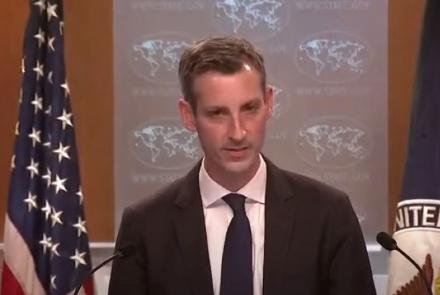US Calls on Iran, Region to Support Afghan Peace

Ned Price, US State Department spokesman, on Wednesday, urged Afghanistan’s neighbors to play a constructive role in Afghan peace talks “in order for there to be a just and durable peace” in the country.
“What Iran is trying to do or is in the process of doing by hosting this meeting may well be constructive. I think the jury is still out. This is obviously not something we have discussed with the Iranians, other than by public–by making the point very publicly that Afghanistan’s neighbors need to be responsible stakeholders,” Price said.
“For too long, many of Afghanistan’s neighbors have been happy to see the United States engaged and the United States alone engaged. If there is to be a just and durable settlement and a comprehensive ceasefire, it needs to be supported, supported by Afghanistan’s neighbors. And we hope to see them act responsibly,” he said.
On Wednesday, a Taliban delegation led by the group’s negotiator Shir Mohammad Abbas Stanikzai met in Tehran with Iranian Foreign Minister Mohammad Javad Zarif and other senior Iranian officials.
The Taliban delegation is expected to also meet with a group of Afghan politicians led by former vice president Younus Qanooni, who travelled there from Kabul.
The Taliban’s spokesman in Doha, Mohammad Naeem, on Twitter said that the Taliban delegation will hold talks with Iranian officials on bilateral issues.
“We are very proud that we remained alongside our Afghan brothers and sisters during the jihad of the Afghan people against the foreign invasion,” said Iranian Foreign Minister Mohammad Javad Zarif in a meeting with the Taliban delegation in Tehran.
The US State Department spokesman also said that Afghanistan’s neighbors “need to use their influence in ways that are positive, in ways that are constructive, in ways that promote the cause of peace, in ways that support the people of Afghanistan.”
“We know that regional consensus and support for an Afghan-led, Afghan-owned peace process, it’s important for enduring peace. When it comes to the recent violence, this is something obviously we have spoken to quite a bit, and the point remains that no government that might come to power in Afghanistan through the use of force, at the barrel of a gun, will have legitimacy or the support, and that can be especially critical, from the international community,” he said.
“Nor would a government that comes to power by force have the support of the people of Afghanistan. And what we ultimately hope to help support and will seek to help support is a just and durable settlement,” he mentioned.
“Every party has an interest in a settlement being durable. The Afghan people have been burdened and, in many cases, brutalized by 40 years of civil war. The United States is supporting the efforts ongoing in Doha right now between the parties, where the parties are in fact still meeting, still talking, to see to it that we can have a just and durable settlement and a comprehensive ceasefire to finally see an end to this violence,” he added.
On Tuesday, the United States Central Command (CENTCOM) confirmed in a statement that the US has completed “more than 90 percent” of its withdrawal from Afghanistan.
This follows the US and coalition forces pullout from Bagram Airfield, which for nearly 20 years was the largest US base in Afghanistan.
“As of July 5, Department of Defense has retrograded the equivalent of approximately 984 C-17 aircraft- loads of material out of Afghanistan and has turned over nearly 17,074 pieces of equipment to the Defense Logistics Agency for disposition,” the release stated.
CENTCOM did not say how many US troops remain in Afghanistan. Between 2,500 and 3,500 were in the country when President Joe Biden announced in April that all US forces would withdraw by Sept. 11, according to reports.
About 650 troops are expected to remain to protect the US Embassy in Kabul, while others may be deployed to protect the capital’s airport alongside Turkish troops, according to reports.
